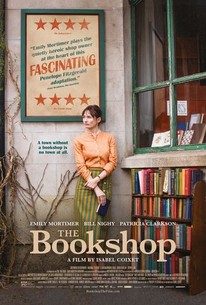‘The Bookshop’
Reading Time: 2 minutes
‘The Bookshop’ is a film that is different in a number of significant ways. While this makes it more memorable, it also makes it less sugar-coated. It most certainly is not a Hollywood movie.
The film’s main character is Florence Green, a youngish widow who, while delightful, is not as physically attractive as female leads tend to be. Similarly, although this is a period piece, we are not dazzled with exotic props and our leading actor displays little if any dress sense.
The storyline is very straightforward – a widow opens a bookshop in a small English town. This pits her against Violet Gamart (played by Patricia Clarkson) the powerful upper class woman who lives in the mansion on the hill.
The film’s underlying theme is the love of books, and it conveys this in an attractive manner. Those of us who believe that interior walls are incomplete without book shelves holding up our prized books, will find this aspect of the film reassuring (perhaps it’s not a disorder after all).
Although the feeling has waned since, my initial response to the film was one of sadness and anger. My viewing companion, on the other hand, found the film to be largely realistic and inspiring. My first reactions were probably a response to the injustice and unfairness of the English class system depicted in the film. A few hours after the screening, I came around to my companion’s view that a rosier story would have been an unrealistic presentation of mid 20th century Britain. I suspect that I have become accustomed to expect certain story developments or endings, irrespective of their realism.
The film boasts a star studded cast including Emily Mortimer, Patricia Clarkson, Bill Nighy and James Lance. The stand-out performance is that of Bill Nighy, who is sensational as a reclusive with a heart of gold. In this role he displays the intensity of his phenomenal acting talent – a talent that is clearly not confined to the bumbling comedic roles for which he is mostly known.
The performances of the established actors are almost outshone by Honor Kneafsey, as Christine, a beautiful young readheaded girl who plays a key role in the film, and without even one ‘cutesy, smart one-liner’ scene.
For those who like a a little romance in their films, this film delivers, demonstrating to crass Hollywood script writers and producers, that to be effective and memorable love and sexual tensions don’t need to be spelled out and presented as patently as they tend to be (and perhaps are expected to be).
As the film shows Bill Nyghe, the thespian at his very best, his many fans should love ‘The Bookshop’. Others may savour the film’s slower pace and matinee movie feel. However, in order to truly appreciate this film, it does help to be a bibliophile.
(Visited 17 times, 1 visits today)
